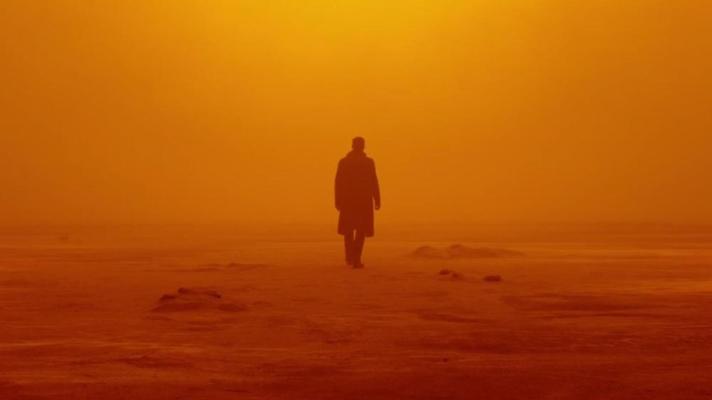If there’s a classic science fiction movie that absolutely doesn’t need a sequel, it’s Blade Runner.
After all, how could a second film improve on the original’s depiction of futuristic Los Angeles? Even if the real L.A. seems unlikely to acquire quite as many flying cars and giant neon billboards by 2019, Blade Runner still sets the standard for seedy science fiction metropolises.
More importantly, the first story ends on a perfect note of uncertainty (at least in Ridley Scott’s director’s cut, as well as his subsequent “final cut”). What could a sequel do, except ruin that ambiguity?
And yet Blade Runner 2049 (which opens this weekend) manages to avoid the obvious pitfalls. Its plot, like Blade Runner‘s, feels gratifyingly self-contained, with no transparent attempts to set up a series of sequels or spinoffs. Nor does it go out of its way to wrap up lingering mysteries from the first film — if something was ambiguous at the end of Blade Runner, it’s probably still ambiguous at the end of 2049.
There is one question that writers Hampton Fancher (who co-wrote the original film) and Michael Green seem to have closed the book on: Whether the replicants — the humanoid robots hunted by the blade runners of the title — should be considered human.
In Blade Runner, there are suggestions — like the telltale glint in their eyes, or their inability to pass a Voight-Kampff empathy test — that there’s something fundamentally different about replicants. What settles the matter, ultimately, is Rutger Hauer’s performance as Roy Batty. Batty (a replicant) can be violent and cruel, but his humor, his rage, and finally his compassion make him seem more alive, more human than anyone else in the film.
In Blade Runner 2049, characters still refer to replicants’ inferiority (in one conversation, a replicant is told that he doesn’t have a soul), but it’s become even more obvious that this is a lie — a necessary fiction to continue their enslavement by “real” humans. Even more than in Blade Runner, the injustice of this enslavement is one of the central topics of the film.
As for the world the replicants and their makers inhabit, director Denis Villeneuve doesn’t try to top Blade Runner‘s cityscape. His Los Angeles remains dark, rainy and gloomily beautiful, but it’s essentially unchanged from Scott’s depiction of 2019.
Villeneuve seems to have been more inspired by the task of creating a world beyond the city limits. This world was mentioned but never seen in Blade Runner, while the new film gives us a landscape that’s been blighted by environmental catastrophes and is now largely abandoned. (With its enormous, beautiful ruins, Blade Runner 2049 actually feels closer to the source material, Philip K. Dick’s novel Do Androids Dream of Electric Sheep?)
I haven’t really said anything about the story or characters yet, partly because Warner Brothers was particularly insistent that reviewers not spoil anything. But I can confirm that it takes place in the year 2049. Ryan Gosling plays K, a blade runner whose investigation (eventually) leads him to Harrison Ford’s Rick Deckard, who’s been in hiding since the events of the first film.
Gosling is fine as our new lead, delivering something like the mix of quiet competence and emotional distance that we saw in Drive, except this time punctuated by explosions of anger. Ford, meanwhile, isn’t all that far from the grumpy old man he played when he returned to Star Wars — but as in The Force Awakens, he’s also given opportunities to show real emotion, and he takes full advantage of them.
It’s a slow, quiet story, with plenty of time (163 minutes!) to appreciate the visuals. Maybe it’s a little too quiet. I’m always on-board for a sad, beautiful science fiction movie, but I don’t think the new Blade Runner has a character quite as memorable as Batty (or Pris, or J.F. Sebastian), or a scene as perfect as Batty’s final conversation with Deckard.
In the end, I found that I admired the movie more than I was moved by it. (That’s also true of Villeneuve’s previous film, Arrival). Nor did Blade Runner 2049 quite convince me that Blade Runner truly needed a sequel. And I suspect it won’t match the singular impact and influence of its predecessor.
Still: It’s a thoughtful, well-made science fiction film. And that’s well worth the price of admission.
Update, October 8: So I saw it again yesterday, and I realized that describing it as “quiet” might seem a little silly when the soundtrack can be deafeningly loud. The movie manages to be bombastic in some ways while showing restraint in others, with a climax that highlights both qualities — the music and sound effects made me wish I had earplugs, but it was also relatively small scale for the finale of a scifi blockbuster. (And it was followed a scene of genuinely quiet melancholy.)
